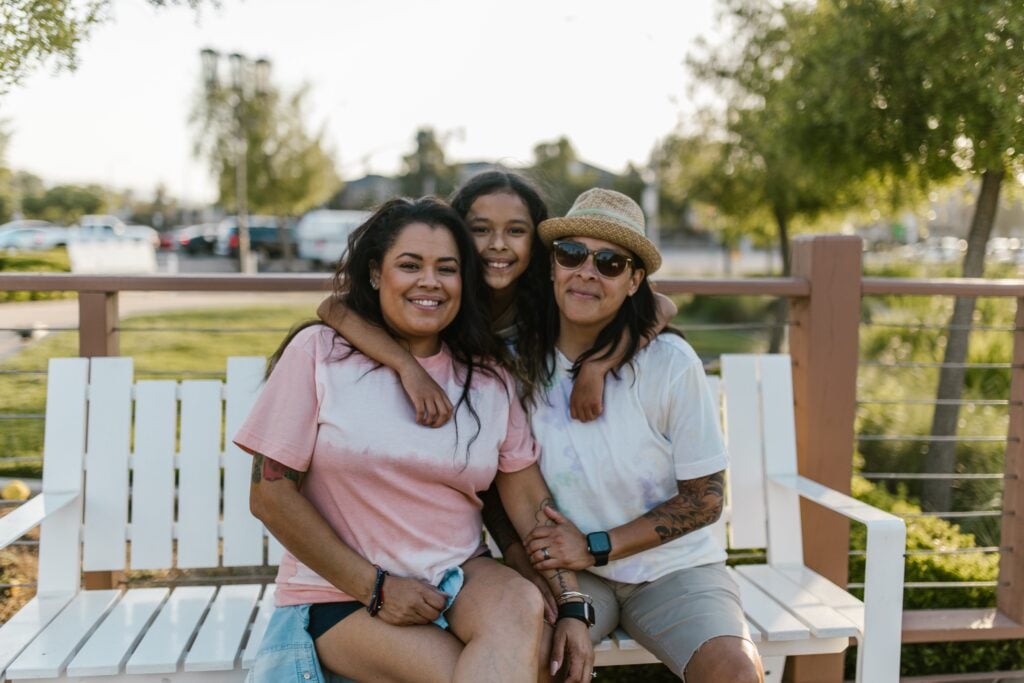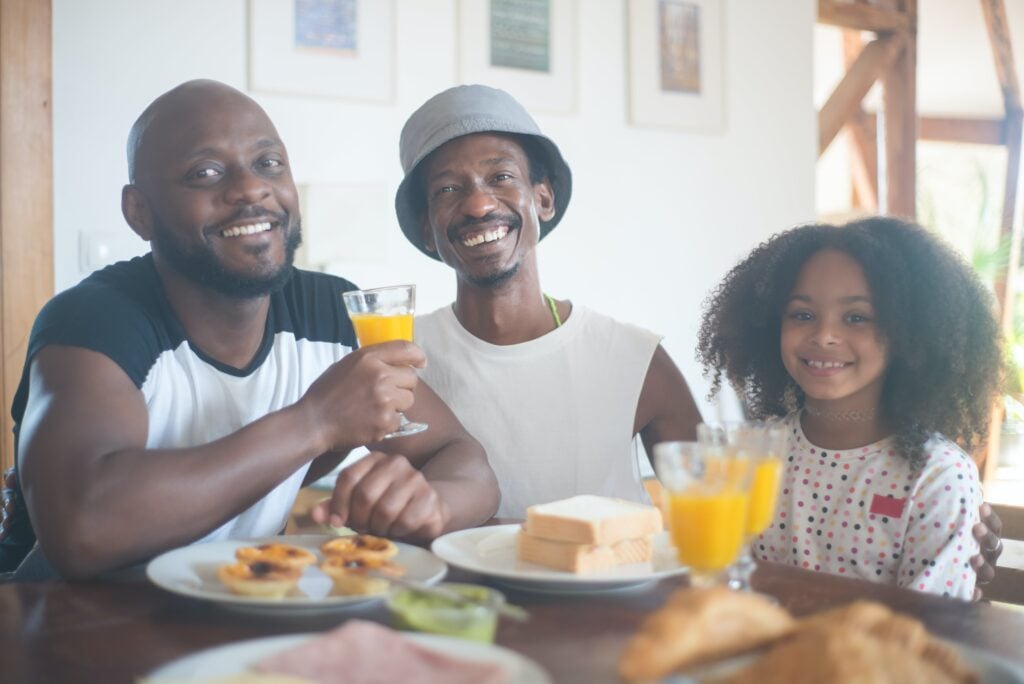Travelling Abroad as an LGBTQ+ Family

By Cath Brew
Travelling with kids can be nerve- wracking for any parent. It takes research, a heap of planning, and a generous sprinkling of super-human effort. In fact, as I sit in a café drafting this article, a woman has just asked me to look after her child in a highchair, whilst she ferries all of their stuff down the stairs to her own mother, who’s waiting with the other child. When I tell her what I am writing about, she laughs and says, “Oh it’s a nightmare!” There. Proof. Travelling with kids is hard.
For LGBTQ+ families, it can be even harder.
No place is 100% safe for any family. Yet, LGBTQ+ parents have additional
The key steps in planning a military operation include:
considerations to discern, especially in the context of common heteronormative expectations.
And for LGBTQ+ parents, who might have once been able to fly under the ‘heteronormative radar’ as a travelling individual or couple, the addition of children to their family changes everything.
Holidays are about connecting as a family, relaxing together, and absorbing different experiences. It is normal to want to protect your family and not expose your children to homophobia, transphobia, or biphobia.
So how do you prepare for a LGBTQ+ family holiday abroad?
Research your destination
Which countries are safe for your family? What are their laws about LGBTQ+ rights? According to the Human Dignity Trust homosexual activity is illegal in sixty- five countries. It is also important to be aware of how these laws are enforced. For example, in the Maldives, homosexuality and same-sex marriage are illegal and punishable by prison and one hundred lashes for both gay men and lesbians, but these laws are largely ignored on the island resorts where tourists stay. Many LGBTQ+ tourists are happy to enjoy that privilege, whilst others are not. It is a personal choice. However, laws are laws and it is important that you understand what the potential legal risks are if these laws are enforced.
If you have only ever travelled domestically with your children, consider starting small. Get confident, then progress into more challenging travel. First off, book an all-inclusive holiday with an LGBTQ+ friendly travel company like Destination Rainbow or through IGLTA (International LGBTQ+ Travel Association), rather than do independent travel. Alternatively, choose a country you are already familiar with; one where you know that the laws and locals are inclusive.
Transiting through intolerant countries on route to your destination can add to your stresses. It may be easier for your nerves to fly routes that stopover in countries where LGBTQ+ people are legal. However, if you find that you need a night in a hotel between flights, major chain airport hotels are often a better choice. It all depends on your safety comfort levels. Do your research and decide what is right level of safety for your family.

Select LGBTQ+ friendly accommodation
When my wife and I travel, we tend to stay in hotels, rather than ‘family-owned’ guest houses or a Bed and Breakfast in someone’s private home. It reduces the chance of your holiday being ruined by a host who reacts negatively to your family. Search for hotel chains who are committed to equality in the Human Rights Campaign Foundation’s Corporate Equality Index (USA based). It is a benchmarking tool that measures which companies are best for LGBTQ+ employees. The list includes major hotel chains, many of which also have hotels outside of the USA. Equally, search online to find one of the companies that specialise in LGBTQ+ friendly accommodation internationally.
Consider pre booking a car through your hotel to pick you up from the airport. When you’re tired after a long flight and everything is unfamiliar, a hotel car is a good safer option. Whilst it very much depends on the country, drivers are commonly insured, licensed and therefore accountable, should anything happen.
Again, you might also like to consider an all-inclusive holiday. With an all-inclusive you do not have to leave the hotel much and staff will be more used to international visitors and LGBTQ+ people.
Bring your documentation!
At international borders it is normal to expect extra levels of scrutiny. Having the correct paperwork is critical for streamlining these processes for your family. Imagine, you are two gay dads travelling with your young kids, without the right paperwork.
To an official, you are effectively two men travelling with two young children who do not share your name. That is certainly going to raise alarm bells!
Bring proof of adoption (especially if your kids are young and cannot speak for themselves). If a parent is not on the birth certificate, make sure to carry a notarised letter from the parent who is on the birth certificate.
In case of emergency, who has rights of access or making decisions about medical care? If you are married, carry a copy of your marriage certificate or civil partnership with you, in case one of you ends up in hospital. That way you can prove you are married and permitted to visit your husband/wife. Equally, for a medical emergency with your children, without proof of being their parent, you are unlikely to be given permission to go in the ambulance or stay with them if they are admitted to hospital. Also make sure too that your insurance documents include your name AND your child’s.
Most of the time you will be fine with no problems, but it is always a good idea to have documentation as your back up. The last thing you want in an emergency, if scrutinised, is to not be able to prove who you are and your relationships to each other.
Do not assume either that you will be in a state to protect your wishes around your body. As a transgender person, if you have an accident and are found unconscious, you may be more vulnerable to discrimination. Whilst this is an extreme circumstance, accidents do happen. Imagining a worst- case scenario may help you to choose which countries you travel to.
Be prepared to answer questions
We live in a heteronormative society, with all the expectations and questions that go with that. Just like when they are at home, two dads might be asked, “Where’s their mother?” or one gay dad by the pool, might get “it’s so nice you’ve taken the kids on holiday. I bet your wife loves you!”
Most people do not even realise the mistake they are making in asking. It is usually innocent ignorance, but how you answer sets an example to your kids. How you answer may also change depending on the country you are in. Before you travel, give some thought to how you might answer these types of questions in different scenarios. That way, you will not be taken off guard and be grappling to provide an answer that matches the situation. As a foreigner, it is always wise to play it safe and remember that you are in another country with different laws, cultures, and customs. What works at home, may not work as well in your holiday destination. A good rule of thumb is ‘be polite and more conservative with your responses if you’re unsure.’
Travelling as an LGBTQ+ family can be fun, but it does include extra considerations and planning to ensure you stay safe. Of course, there are always circumstances you cannot control, and countries which are more dangerous to LGBTQ+ families than others. Yet, with research and using the LGBTQ+ friendly resources wisely, there is an awful lot of the world to safely enjoy and discover!

